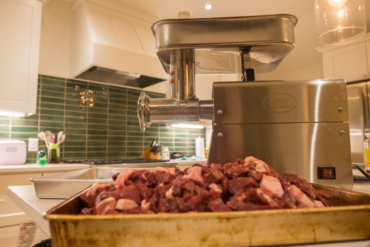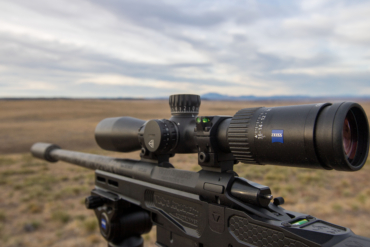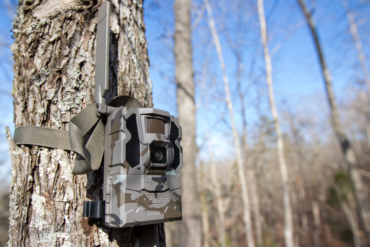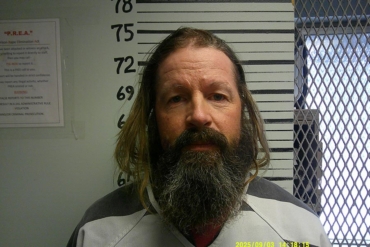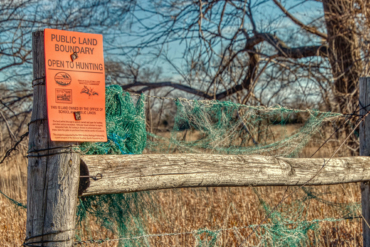The worst part about hunting is when it doesn’t all come together.
When I was a kid, hunting was simpler. It meant cold early mornings, hot coffee, and trying to plan out how I’d keep my feet warm that day. I’d spend time around a campfire with my dad, staring at the burgers he was cooking while trying to will them to cook faster.
It wasn’t until later in life, though, that I really started taking the “hunting” part of hunting seriously. Once I did, hunting started to look a bit different. I knew failure was a regular part of hunting.
After all, we don’t always fill tags, right? I didn’t learn the different layers of that failure until I was older, though.
One of those layers is losing an animal after shooting it. It’s a part of hunting that doesn’t catch a whole lot of limelight, but it’s a very real part nonetheless. It’s a gut-wrenching feeling, and one not easily dealt with.
What follows are my thoughts on how to best deal with that loss.
The Legalities Around Harvesting (and Losing) an Animal

Before we dive into the twists and turns that make up the emotional roller coaster of losing an animal, some might pose the question, “Is this even legal?” I’m happy to break this scenario down for you.
Hunting is, of course, regulated. We aren’t free to just go out into the hills willy-nilly and try to kill animals. Tags for species are acquired through both lottery systems and over-the-counter sales with the possession of a valid hunting license.
There are specific seasons for hunting, as well. And when we are lucky enough to harvest an animal, we are truly harvesting it. The meat from these animals fills our freezers and feeds us and our families back home.
In fact, it’s mostly illegal to not take the meat with you. Wanton waste law prohibits it, but that can waver depending on the species. So, hunters are required to know the regulations for whatever they’re hunting wherever they are and act accordingly.
The law basically states that we are not permitted to intentionally kill an animal and purposefully neglect its remains by leaving the meat in the field. But again, the meat counts. And hunters consume more species than many think, including black bears, mountain lions, squirrels, birds, wolves, and more.
Nobody Is Perfect
First and foremost, nobody is perfect.
We know this deep down but oftentimes, we refuse to accept our own shortcomings. Even after vigorous training and calculated practice, things can still go awry. That’s no reason to not work hard beforehand, but it just goes to show that we are only in control of so much in the field.
We can’t predict everything. Animals jump strings and take unexpected steps. We can’t adequately prepare for the overcoming adrenaline that may hit us at a moment’s notice, resulting in the shakes behind the rifle.
All we can do is do our absolute best, and the rest is up to fate. Sometimes, fate is not on your side, though.
Often, this comes at the expense of our heartbreak. Recognize these things and accept them for what they are: variables out of our hands that impede our success.
Although difficult to accept at times, I’ve found that doing so tends to lessen my stress and helps me move on easily when things don’t go to plan. The quest for perfection will never end. This is one of my favorite things about hunting.
It Happens More Than You Think

As little as it’s talked about, losing animals is something that happens much more than one might think.
In hunting media, what we are seeing is often a highlight reel. It’s all of the good stuff. I mean, who wants to reveal their dirty secrets of misses and wounded animals, right? Just sweep it under the rug, and people don’t know what they don’t know.
One part of me understands this, but the other part is severely disappointed. It paints an unrealistic picture of what hunting is as a whole, which results in a skewed perception for newer hunters.
Missing and losing animals — while obviously not sought after — are things that are going to happen. If you spend enough time trying to deliberately kill animals, you’re bound to mess up now and again.
Mountain lions are one of the most efficient predators in North America, and they’re not always successful. I hate to break it to you, but we are a far stretch in terms of hunting skills from mountain lions.
For instance, wound rates for bowhunting in North America sit anywhere from less than 20% to north of 50%, depending on where you are. Those are not small numbers. It happens and will continue to happen.
Should You Notch Your Tag if You Wound and Lose an Animal?
As we jump into the more philosophical side of losing an animal on a hunt, it’s worth it to dig into what you should do regarding your tag.
There is certainly debate on whether to keep hunting on a tag or not. In some areas, once you touch an animal with a projectile, you’re done hunting no matter what — whether you find the animal or not. You must notch and void the tag you’re carrying for that particular species.
In most areas, there is a healthy dose of morality and ethics that play in. There, it is legal to keep hunting after you’ve conducted a proper search. Some hunters choose to punch their tags if they can’t find a hit animal.
And then there are some that, after exhausting all options, will continue to hunt. I’ve done both. In every one of these scenarios, the game and fish department has always told me to keep hunting if I’ve done my due diligence. And if you’re worried about it, give your department a call.
In the end, the choice is really up to the hunter. Most hunters tend to make a choice that works best given the scenario at hand. Many certainly will punch tags if they think it was a mortal wound.
Learn From It

In the instance that you do find yourself following a blood trail with nothing at the end of the rainbow, all you can do is learn from it.
It should be in our best interest to constantly evolve as hunters. Be better today than we were yesterday.
So, while it’s an awful feeling losing an animal, use these moments as a lesson. Let the mountains be a classroom, and you be the attentive student willing to further your knowledge.
Analyze everything here from your shooting, angle of the animal, the animal’s reaction to the shot, quantity of blood, color of blood, spatter pattern of blood, etc. Pay attention to how far the animal went, their direction of travel in relation to the topography, and if they’re bedding down or not.
These are all things that will help you out on the next blood trail. They’re valuable pieces to an ever-evolving puzzle. Over time, you’ll have a much better view of how to avoid a bad situation.
Keep On Keeping On
Another note to mention here is staying persistent. Far too many people give up too early and are left drowning in their sorrows at the nearest fast food joint. Just by simply not giving up, you can potentially avoid having to go through the emotions of losing an animal altogether.
There have been a few instances in the past where I thought all was lost. The blood was gone, tracks disappeared, and I was left sitting down with aimless thoughts thinking of what could have been. And then all of a sudden, the missing piece presents itself and I’m standing next to the animal.
Hope is only lost if you let go of it.
This also means staying after it when all is said and done. Doing things like revisiting the scene of the shot and looking for birds, or even trying to grid search areas for more sign, will help mentally.
It’ll help bring some closure, which is exactly what you need at a time like this. And that closure can be that the animal, to the best of your knowledge, is still alive. Or it’s the closure of finding the remains after they’ve been picked clean by the locals. It helps.
I Almost Quit

The first time I had ever lost an animal, I was bear hunting in my home state of Arizona. It had been a long bear season, and there was just one more day of it. At 7:30 a.m., a chocolate bear walked out beneath me. I couldn’t believe it.
Fighting through my nerves, I was able to take a shot. My excitement was through the roof. After 14 hours of trailing, that excitement turned to despair. Along with that, I felt horrible.
An animal that I deeply respect was now trudging through this harsh environment with a wound it didn’t deserve.
Losing that bear almost made me quit bear hunting for the year and made me reconsider bear hunting ever again, to be frank with you. I stewed on this for months talking to people from the local game and fish department as well as some very respected hunters.
All of them knocked some sense into me, and the following October I did harvest my first bear. That was an experience I’ll tell my grandkids about. Looking back on that loss, it was the perspective that I lacked at the time — the realization that these things happen.
I don’t like it, never will, and I will always do my best to not lose an animal.
With that said, a lion doesn’t always catch its dinner. Stay hungry.

